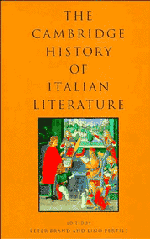Book contents
- Frontmatter
- Origins and Duecento
- The Trecento
- The Quattrocento
- The Cinquecento
- The Seicento: Poetry, Philosophy and Science
- 15 The Baroque
- 16 Lyric poetry
- 17 Mock-epic poetry and satire
- 18 Treatises
- Narrative prose and theatre
- The Settecento
- The Age of Romanticism (1800–1870)
- The Literature of United Italy (1870–1910)
- The Rise and Fall of Fascism (1910–45)
- The Aftermath of the Second World War (1945–56)
- Contemporary Italy (since 1956)
- Bibliography
- References
15 - The Baroque
from The Seicento: Poetry, Philosophy and Science
Published online by Cambridge University Press: 28 March 2008
- Frontmatter
- Origins and Duecento
- The Trecento
- The Quattrocento
- The Cinquecento
- The Seicento: Poetry, Philosophy and Science
- 15 The Baroque
- 16 Lyric poetry
- 17 Mock-epic poetry and satire
- 18 Treatises
- Narrative prose and theatre
- The Settecento
- The Age of Romanticism (1800–1870)
- The Literature of United Italy (1870–1910)
- The Rise and Fall of Fascism (1910–45)
- The Aftermath of the Second World War (1945–56)
- Contemporary Italy (since 1956)
- Bibliography
- References
Summary
Traditionally, the term ‘Baroque’ defines the period from the death of Tasso (1595) to the foundation of the Accademia dell'Arcadia (1690). However, as often occurs with such periodisations, dates must be taken with some flexibility. Indeed, in this specific case it is not always clear when Mannerism ends and the Baroque begins, nor when the Baroque period ends and Rococo begins. Our task would be easier if it were possible to identify clearly the main characteristics of the Baroque; but we are far from such clarity and the debate on what is typical ‘Baroque’ is still going on. The only certainty we have is that literary historians have systematically considered the Baroque the nadir of Italian literature, and as a result it is its least studied period. The first condemnations came from the historians who promoted the later ‘Arcadia’, Muratori and Tiraboschi, who found the metaphors of the Baroque utterly extravagant. The historians of the Enlightenment did not disagree with their predecessors: Baroque literature was lacking any decorum that reason could dictate. The Romantics perpetuated the Enlightenment disdain for this period: not only did they consider it too prone to artificiality and insincerity, but above all (as Manzoni demonstrated) they saw the Baroque as the expression of the most humiliating moment of the Italian nation since the peninsula was occupied by foreign forces. The idealistic criticism of Croce was no more generous, although Croce was the scholar who did the most (as critic and editor) to promote the study of seventeenth-century culture.
- Type
- Chapter
- Information
- The Cambridge History of Italian Literature , pp. 299 - 302Publisher: Cambridge University PressPrint publication year: 1997

